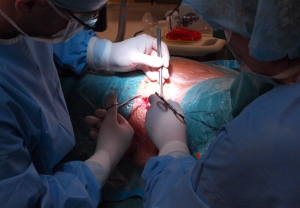
Recently, a DeKalb County, Georgia Jury awarded former boxer, Jamil Jenkins, age 34, $ 1.5 Million in damages for a surgery in which Mr. Jenkins went into surgery for a gall bladder removal and ended up with permanent neurological damage due to medical malpractice. During the surgery, the surgeon, Dr. Rodrick Stevenson, while trying to reach the gall bladder was negligent when Jenkin’s right common iliac vein was cut during the procedure.
At the time of his surgery, Jenkins was studying aviation maintenance, had been former car mechanic, security guard, and an amateur boxer, and is now not able to work in any of these fields due to his injuries. In fact, he lives on Social Security Disability benefits and lives with his mother.
The surgeon was an employee of the DeKalb Medical Center and under the legal doctrine of Respondeat Superior the hospital will be responsible for the total amount of the verdict. The doctrine of Respondeat Superior basically states that if an employee is acting in the course of his or her employment for an employer, and the employee is negligent in carrying out his or her duties for the employer, that the employer could be held responsible for the actions of the employee as in this case where the hospital, as the employer, is being held responsible for the actions of the surgeon, the employee.
One of the interesting parts of this case is that both the Defense and the Plaintiff brought in witnesses that were surgeons who had collectively completed 15,000 gall bladder surgeries and they testified that although a known risk of this type of surgery is that an artery or vein could be cut during this procedure that none of them, except for the surgeon in this case, who had 20 years of experience, had ever done so in their careers except for one witness for the Defense who apparently cut an aorta.
Since this indicates that, although there is a risk of this type of injury in this type of surgery, it is highly unlikely and, therefore, the Jury determined that the surgeon in this case had breach the Standard of Care and was negligent and that his negligence caused the nerve damage to the Plaintiff.
The following are some of the important questions to ask in a Medical Malpractice Case such as this when there is a Deviation from the Standard of Care that results in Nerve Damage, and why each question is important:
1.) What were the Risk Factors Elicited from the Patient?
Why is this important? A complete and thorough medical history must be elicited from the patient prior to surgery such as whether there was a history of focal nerve abnormality in the area of be operated, was there a history of diabetes, was the patient obese, or was there a history of alcoholism, just to name a few of the questions that should be asked and answered prior to surgery.
2.) Which Nerve Injuries did the Patient Develop?
Why is this important? There are four underlying basic pathologic forces responsible for a neuropathy; stretch, compression, generalized ischemia and metabolic. Ultimately, all of these forces cause sufficient ischemia within a nerve to result in transient or permanent nerve structural or functional damage.
I will continue to discuss some of the important questions to ask in a Medical Malpractice Case such as this when there is a Deviation from the Standard of Care that results in Nerve Damage, and why each question is important in my next blog post titled, “DeKalb, Georgia Jury Awards $1.5M to Former Boxer in Medical Malpractice Surgical Case ~ part two.”
At Julie A. Rice, Attorney at Law, & Affiliates we are experts at Medical Malpractice Cases so if you or a loved one has been injured due to Medical Malpractice at any time, with or without surgery, then please Contact Us as soon as possible for your free legal consultation. We are here to assist you, and we look forward to hearing from you soon.